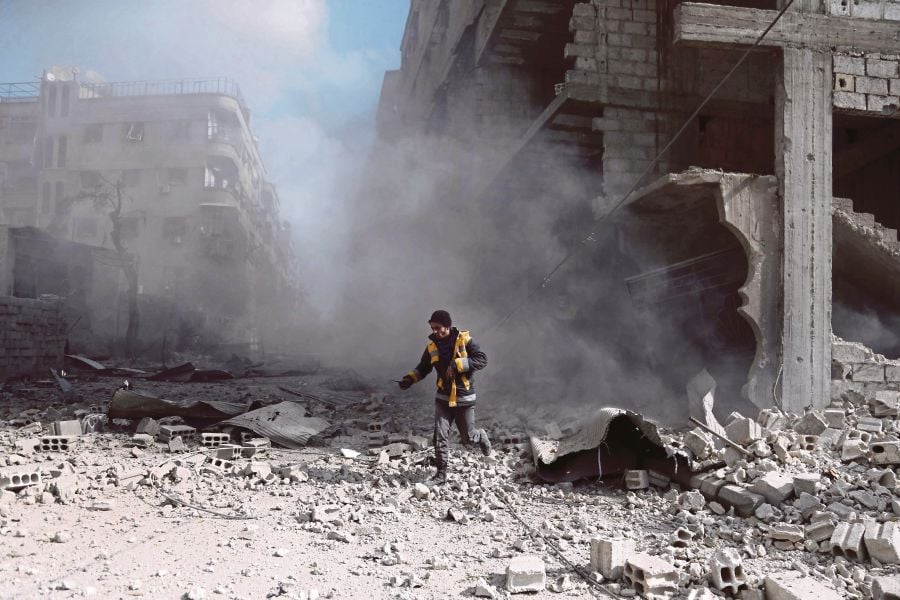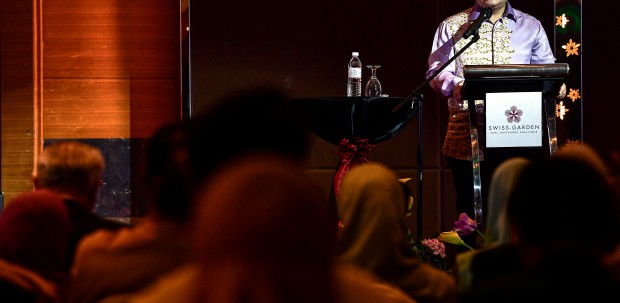THE sheer terror on the face of little Noor and her sibling, Alaa, in their house in East Ghouta, the rebel enclave near Damascus, is heart-rending.
The area has seen relentless bombardment over the last week, resulting in over 500 civilian deaths, including 121 children.
It was as if the reality of the situation had transcended the stratosphere and transported me through the television screen and onto the conflict zone.
“Warplanes are bombing our building. Save Ghouta,” was the desperate plea of the two sisters to the world.
At the local clinic, what was left of it, a wailing mother retorted: “I am waiting for my baby son to die. At least in Heaven there is food.”
While Ghouta burns, the world fiddles. It is as if Noor and Alaa’s pleas are falling on deaf ears. By any standard, this is a massacre, which perhaps, on another day and in another conflict, would have seen the perpetrators hauled in front of the International Criminal Court (ICC) to answer charges for war crimes.
While non-governmental organisations, human rights groups and activists are playing a commendable humanitarian role to mitigate some of the effects of the war, the global and regional powers and blocs appear to be just paying lip service with their attempts to “resolve” the Syrian civil war.
The conflict has given rise to new understanding of the concept of “compassion fatigue”.
The Syrian civil war is in its seventh year, which has resulted in 6.1 million being internally displaced and 5.5 million becoming refugees, and 13.1 million Syrians in need of aid. The hundreds of thousands of dead speak through these statistics of destruction.
An isolationist President Donald Trump has put America “first”, including in foreign policy priorities. This is tempered by his seemingly Islamophobic mindset and ambiguity in his dealings with Orthodox Russia, especially President Vladimir Putin, effectively giving Kremlin a carte blanche in its foreign forays.
America’s lack of compassion, which I measure in terms of policy deficits and political apathy and which the Obama administration is equally guilty of, is matched by Europe, and other major players. It seems only Angela Merkel stood out as a Teutonic “Joan of Arc” when she allowed a million Syrian refugees to settle in Germany to the chagrin of her political opponents and almost at the cost of her chancellorship.
There are notable precedents — Bill Clinton took on Serbian chauvinism by bombing Belgrade to pre-empt loss of life in both Bosnia-Hercegovina and Kosovo. The ICC even brought a string of Balkan perpetrators to book, including Serbian strongman Slobodan Milosevic. Clinton and his international partners worked tirelessly in what they believed to be a “Just War”.
Perhaps Trump should heed the advice of one of his illustrious predecessors, Abraham Lincoln, who said: “To sin by silence when they should protest makes cowards of men.”
The United Nations, I have argued, is well past its sell-by date. It has become a bloated glorified global entity, many of whose cadres indulge in civil service tourism. The UN does some commendable work in humanitarian, disaster management and human rights issues, but, just as the anachronistic Security Council is not set in stone, so too is the UN.
Its predecessor, The League of Nations, grew out of the ashes of World War 1 through the Treaty of Versailles to herald in a New World Order in 1919 to pre-empt future conflicts. But, American president Woodrow Wilson’s dream failed when Hitler invaded Poland and precipitated World War 2 in 1939. His successor, president Franklin D. Roosevelt, who coined the name “United Nations”, worked with the Allies to design the main features of the UN while war was in progress.
In a post-industrial, post-modernist and post-truth world, where things seem to be driven by algorithms, digital economy, artificial intelligence and social media, perhaps it is time that we jettison the UN and come up with a new inter-societal organisation more suited to the political, economic, equality and conflict resolution challenges of the 21st century.
I am reminded by the words of Edmund Burke, the 18th century Irish philosopher, widely regarded as the Father of Conservatism, who said: “The only thing necessary for the triumph of evil is for good men to do nothing.”
The writer is an independent
London-based economist and writer






